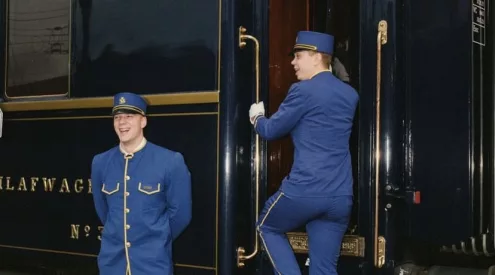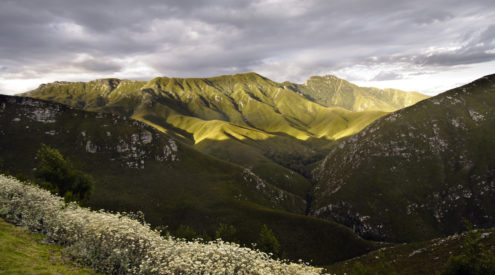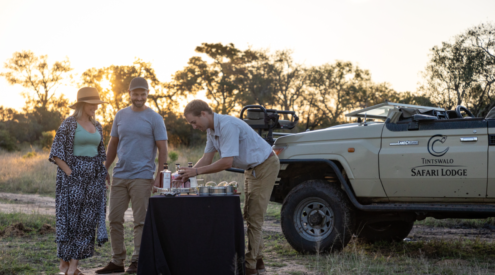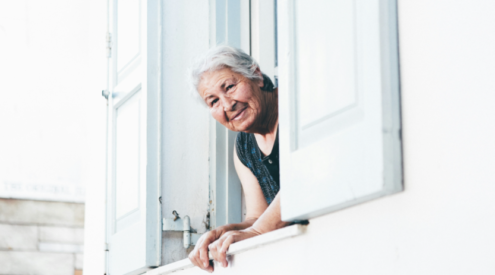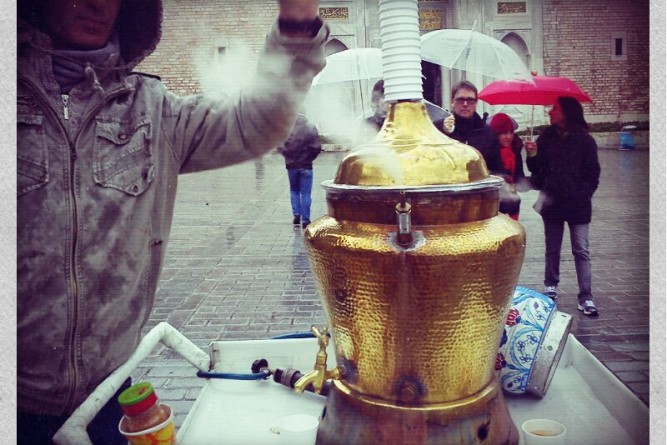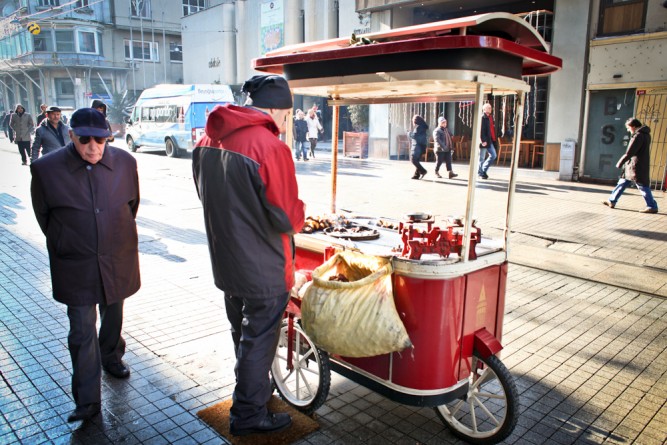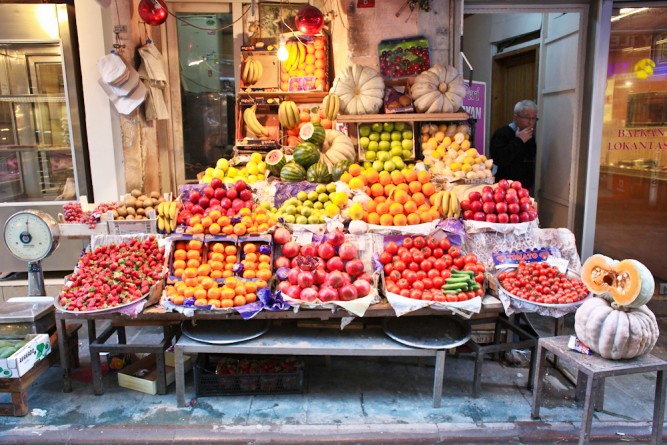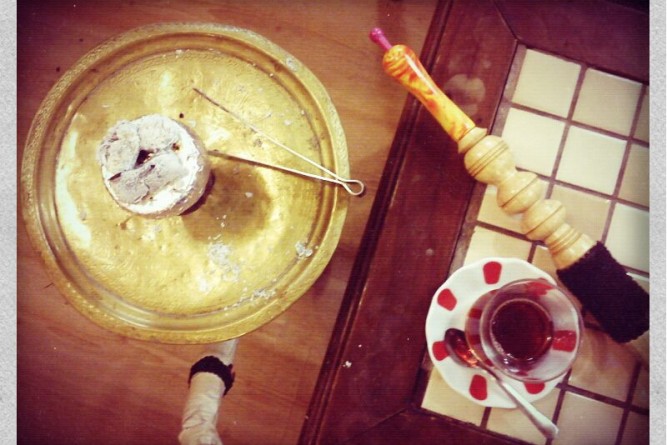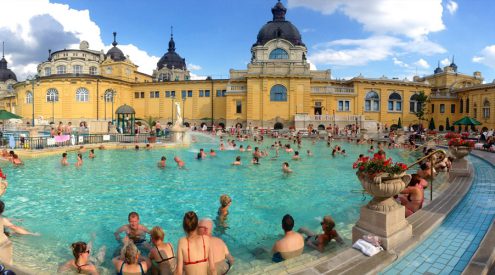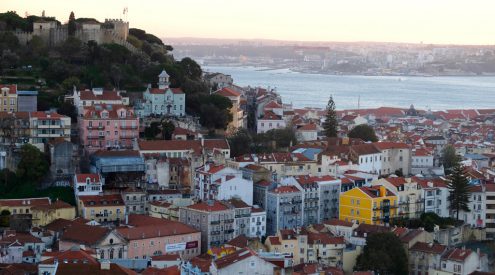The story of a love affair
“Come in, you look cold, have some apple tea!” As a South African negotiating snow-covered cobbled streets, I was cold. As a tea lover, I couldn’t say no – almost every time I heard that welcoming, which was often, considering that Turkish shop owners are probably the most exquisitely hospitable salesmen in the world, and that sharing a cup of tea means “We’ll be friends for forty years!” How can you refuse such a gesture?
Istanbul is a city steeped in history and rich in culture. Even in winter, even in the snow, the streets are alive with activity. In fact the snow only added to the charm of it. I fell in love. What’s to love? The beauty, the architecture, the art, the colours, the bazaars, the nargile and tea houses, the turkish baths, the people, the vibrance. And, of course, the food.
Eating, praying, loving it
If you’re a traveller looking to satisfy your palate, you won’t be disappointed. Let’s begin this tale of food on the streets. Depending where you are in the city, from Sultanahmet with it’s arabic prayer soundtrack, to Karakoy with its grungy art galleries and general hipness, you’ll find vendors of varying kinds – from fire-engine-red wheely carts to tiny kiosks to market lanes. In winter, the carts offer roasted chestnuts, a variety of Turkish breads (like ‘simit’, which people pick up to munch on the way to work), and a rich and nourishing hot drink made from the roots of a mountain orchid, called ‘sahlep’.
At many kiosks you’ll find all the goods you’ll need to fend off any flu viruses – fruit, fruit and more fruit – the main attraction for me being the holy pomegranate. By the heap, and they’ll freshly press a few of them into a cup of superjuice for you to sip on while you walk. Considering that in SA you’ll pay about R70 per litre of the cold-pressed ruby drink, this is a bit of a luxury.
While I was meandering through the backstreets of Karakoy one day, seeking out photo galleries, I stumbled upon what I can only describe as ‘Food With A Story heaven’. A market lane jam-packed with a sensational selection of produce, in copious varieties. Buckets of olives, vine leaves, capers and more; bottle upon bottle of pickles; trays of breads and pastries; mounds of spices, fresh and dried fruit, and nuts; veg, fresh fish and more. At this point (and numerous more) I began wishing that I lived in Istanbul and had my own kitchen to take all the beautiful ingredients to and magic up a feast. But I didn’t, so I took photos instead. And, of course, tried and bought tiny morsels of what I could.
Then of course there are the shops and restaurants, from your ever-present kebab shop with steamy windows showcasing their wares, to tiny east-west fusion cafes like Datli Maya (where everything is cooked in an old stone oven – a must do), to the more refined restaurants. The common thread is that the food is all appetizing, and caters for meat lovers and vegetarians alike.
A little flirt never hurts
A place to experience before you leave (or as soon as you arrive, for that matter) is the buzzing atmosphere of the spice bazaar. It’s a sensory assault of colours, smells and tastes – not to mention charm. And if you can handle a dose of good-natured flirtation (which, as a woman, you’ll get whether you like it or not) you can negotiate some pretty good deals on teas and turkish delight that are requisite for taking back home with you.
A civilised past time
If you’ve been to Turkey then you’ll be familiar with their love of tea and coffee drinking. It’s a practice that is woven deeply into Turkish culture, and everyone does it, all day long. It’s just a guess, but it makes sense that the Islamic influences of the culture, which forbids alcohol, means that tea and coffee (or shall we say caffeine) is the social drug of choice. In Istanbul, of course, alcohol is freely available and regularly consumed, but many restaurants actually don’t serve it. But tea and coffee is found everywhere. And I found it to be quite a civilised past time.
Black, strong and sweet
Turkish coffee is black, strong and if you choose, sweet. It’s still prepared as it was in the 1600s when the first coffee house opened in Istanbul, which means you need to be careful of that last sip, because the finely ground coffee remains in the cup. I learned this the hard way. It was traditionally followed by a piece of Turkish Delight, but these days anything sweet can do the job. I recommend baklava – a syrupy crispy phyllo pastry treat. Interesting fact: It was the Ottomans that first introduced coffee into Europe.
Tea for friendship
Turkish tea, or çay,(pronounced chai, but nothing like the Indian chai) is black tea grown along the Black Sea and it’s drunk without milk. Tea drinking is a big part of Turkish hospitality, and it’s served in curvy, tulip-shaped glasses, which are simply too beautiful to refuse. There are also many other herbal, fruit and spice teas to choose from, but the traditional and most commonly served is the Turkish tea. Tea drinking goes extremely well with nargile smoking and backgammon. Head down to the nargile houses in Beyoglu to see for yourself.
And remember, if you share a cup of tea with someone, you’ll be friends for forty years (so the Turks say). So choose carefully.
To see more images of the culinary side to Turkey, visit www.foodwithastory.co.za

